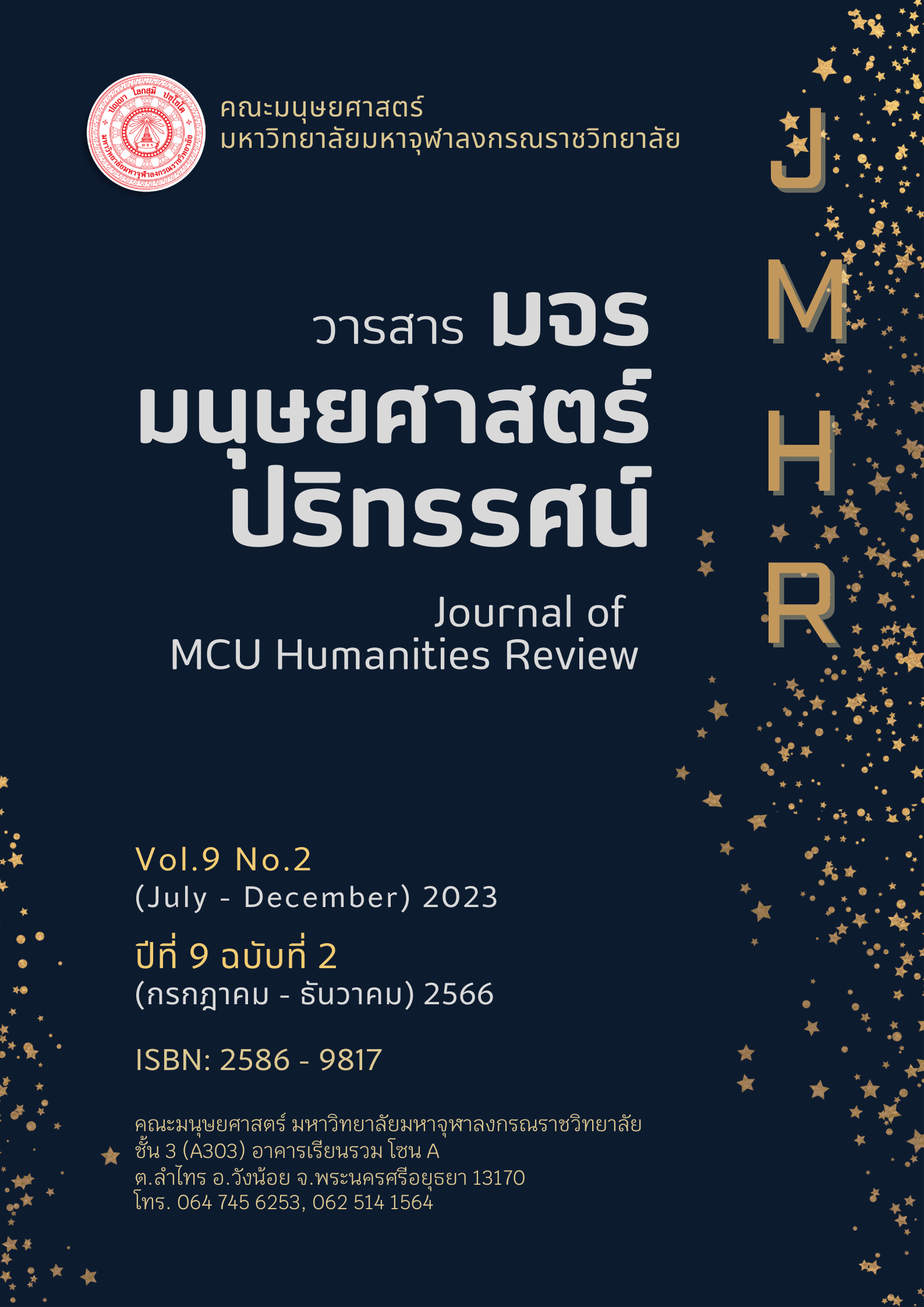การฝึกสติเพื่อการพัฒนาความยืดหยุ่นทางจิตใจในผู้สูงอายุ
คำสำคัญ:
ผู้สูงอายุ, ความยืดหยุ่นทางใจ, การฝึกสติบทคัดย่อ
บทความนี้มีวัตถุประสงค์เพื่อแสดงให้เห็นถึงวิธีการสร้างพลังความยืดหยุ่นทางจิตใจในการฟื้นฟูจิตใจในผู้สูงอายุเมื่อต้องเผชิญกับภาวะวิกฤตทั้งทางด้านร่างกายและจิตใจซึ่งเป็นกระบวนฝึกสติเพื่อการพัฒนาศักยภาพทางอารมณ์และจิตใจเพื่อการเรียนรู้และปรับตัวเมื่อเกิดเหตุการณ์ที่ยากลำบากในชีวิต ซึ่งจะช่วยให้ผู้สูงอายุสามารถก้าวข้ามผ่านพ้นวิฤตไปได้อย่างเข้มแข็ง ถึงแม้ว่าจะมีแรงกดดันจากปัจจัยภายนอกมากระทบ ก็ตามแต่ก็จะไม่สะเทือนจิตใจให้เสียสมดุล พลังใจสามารถฟื้นคืนกลับมาได้เหมือนเดิมอย่างรวดเร็ว ความยืดหยุ่นทางจิตใจ ถือเป็นพลังสุขภาพจิตที่เป็นความสามารถที่จะช่วยป้องกันและดูแลผู้สูงอายุในยามที่ต้องพบกับเหตุการณ์วิกฤตอย่างไม่สามารถคาดเดาหรือควบคุมได้ เพื่อให้ตนเองรอดพ้นจากภาวะวิกฤตที่จะเป็นปัญหาทางสุขภาพจิต โดยเฉพาะวิกฤตโควิด19 ในปัจจุบันถือว่ามีผลกระทบต่อร่างกายและจิตใจที่สร้างความหวาดวิตกกังวลให้กับผู้สูงอายุ ซึ่งถือว่าเป็นกลุ่มเปราะบางที่มีการฟื้นตัวช้าและมีภาวะถดถอยทางสุขภาพอีกทั้งยังมีโรคประจำตัวหลายอย่าง บทความนี้ได้กล่าวถึงความสำคัญในลักษณะของการฟื้นฟูความยืดหยุ่นทางจิตใจของผู้สูงอายุ ด้วยการพัฒนาจิตโดยการฝึกสติในภาวะวิกฤต ซึ่งเป็นวิธีการเสริมสร้างพลังสุขภาพจิตที่สามารถทำให้ผู้สูงอายุสามารถรับมือในการปรับเปลี่ยนความคิด อารมณ์ การกระทำ และเป้าหมาย สร้างเสริมเติมพลังจิตให้เข้มแข็งเป็นแนวทางที่ช่วยทำให้ผู้สูงอายุที่กำลังเผชิญกับปัญหาและภาวะวิกฤตทางร่างกายและจิตใจสามารถกลับมาดำเนินชีวิตอยู่ในสังคมได้อย่างมีความสุข ซึ่งผู้เขียนมีความตั้งใจที่จะนำเสนอเกี่ยวกับภาวะการเปลี่ยนแปลงที่เกิดขึ้น การเปลี่ยนแปลงระบบต่างๆในผู้สูงอายุ รวมทั้งได้นำแนวทางการฟื้นฟูพลังกายพลังใจด้วยโปรแกรมการฝึกสติ
เอกสารอ้างอิง
กรมกิจการผู้สูงอายุ. (2553). พระราชบัญญัติผู้สูงอายุ พ.ศ. 2546 (ฉบับแก้ไข พ.ศ. 2553). สืบค้น 21 มิถุนายน 2565, จาก https://www.dop.go.th/download/laws/regulation_th_20152509163042_1.pdf
กรมสุขภาพจิต. (2552) เรื่องน่ารู้เกี่ยวกับRQ (พิมพ์ครั้งที่ 5). กรุงเทพฯ: สำนักพัฒนาสุขภาพจิต.
“_______”. (2563). เปลี่ยนร้ายกลายเป็นดี พลังสุขภาพจิต RQ : Resilience Quotient. กรุงเทพฯ: สำนักวิชาการสุขภาพจิต กระทรวงสาธารณสุข.
ชนกนันท์ พุทธมนต์. (2564). การศึกษาการใช้โปรแกรมผลของโปรแกรมการให้คำปรึกษากลุ่มแบบออนไลน์ตามแนวทฤษฎีการบำบัดการรู้คิด โดยอาศัยสติเพื่อเสริมสร้างความเข้มแข็งทางใจของมารดาผู้มีบุตรออทิสซึม (ปริญญานิพนธ์ศิลปศาสตรมหาบัณฑิต). มหาวิทยาลัยศรีนครินทรวิโรฒ. กรุงเทพฯ.
ณรงค์ สุภัทรพันธุ์. (2560). สุขภาพจิตผู้สูงอายุ. เอกสารคำสอนภาควิชาจิตเวชศาสตร์ คณะแพทยศาสตร์ โรงพยาบาลรามาธิบดี. กรุงเทพฯ: ม.ป.พ.
ประเวช ตันติพิวัฒนสกุล. (2550). แนวทางการจัดกจกรรมกาเรียนรู้การสร้างความเข้มแข็งทางใจสำหรับนักเรียนชั้นนมัธยมศึกษา. นนทบุรี: โรงพิมพ์ชุมนุมสหกรณ์การเกษตรแห่งประเทศไทย.
พระครูโสภณปริยัตยานุกิจ (อาทิตย์), สุวัฒสัน รักขันโท และ พุทธชาติ แผนสมบุญ. บทบาทพระนักเทศน์กับการส่งเสริมสุขภาพจิตผู้สูงอายุ. วารสาร มจร มนุษยศาสตร์ปริทรรศน์, 8(2), 465-478.
พัชรินทร์ นินทจันทร์. (2558). ความแข็งแกร่งในชีวิต: แนวคิด การประเมิน และการประยุกต์ใช้. กรุงเทพฯ: จุดทอง.
พานทิพย์ แสงประเสริฐ, ศรีเมือง พลังฤทธิ์, สุรศักดิ์ บูรณตรีเวทย์, นติมา ติเยาว์ และ จรรยา ภัทรอาชาชัย. (2018). การทบทวนวรรณกรรมอย่างเป็นระบบ: ประสิทธิผลของการฝึกสติ สมาธิ และการตระหนักคิด ใคร่ครวญ ในผู้ป่วยโรคระบบหลอดเลือด (A Systematic Review of the Effectiveness of Mindfulness Meditation and Contemplation upon Vascular Disease Patients). ธรรมศาสตร์เวชสาร, 18(1), 79-92.
ยงยุทธ วงศ์ภิรมศานติ์. (2559). คู่มือสติบำบัด [Mindfulness–based therapy and counseling (MBTC) manual]. นนทบุรี: บริษัทบียอนด์ พับลิสซิ่ง จำกัด.
สมภพ เรืองตระกูล. (2547). ตำราจิตเวชผู้สูงอายุ. กรุงเทพฯ: คณะแพทยศาสตร์ ศิริราชพยาบาล มหาวิทยาลัยมหิดล.
สุจริต สุวรรณชีพ. (2554). คู่มือความสุข 5 มิติสำ หรับผู้สูงอายุ (ฉบับปรับปรุง). กรุงเทพฯ: โรงพิมพ์ชุมนุมสหกรณ์การเกษตรแห่งประเทศไทย จำกัด.
สุทธิชัย จิตะพันธ์กุล. (2542). ผู้สูงอายุหญิงในประเทศไทย: สถานะปัจจุบัน. กรุงเทพฯ: โรงพิมพ์แห่งจุฬาลงกรณ์มหาวิทยาลัย.
สุวัฒน์ ธนกรนุวัฒน์, สมโภชน์ เอี่ยมสุภาษิต และ สิริวัฒน์ ศรีเครือดง. (2562). การเจริญสติในวิถีพุทธจิตวิทยา. วารสาร มจร มนุษยศาสตร์ปริทรรศน์, 5(2), 185-197.
ศรีเรือน แก้วกังวาล. (2538). ทฤษฎีจิตวิทยาบุคลิกภาพ: รู้เขารู้เรา (พิมพ์ครั้งที่ 4). กรุงเทพฯ: หมอชาวบ้าน.
Davydov, D.M., Stewart, R., Ritchie, K. and Chaudieu, I. (2010). Resilience and Mental Health. Clinical Psychology Review, 30, 479-495.
Williams H, Simmons LA, Tanabe P. (2015). Mindfulness-based stress reduction on advanced nursing Practice: A nonpharmacologic approach to health promotion, chronic disease management, and symptoms. J Holist Nurs, 33(3), 247-59.
Silpakit O, Silpakit C, Chomchan R. (2014). Mindfulness–based care for dementia. Journal of MentalHealth of Thailand, 22(1), 26-37.
ดาวน์โหลด
เผยแพร่แล้ว
รูปแบบการอ้างอิง
ฉบับ
ประเภทบทความ
หมวดหมู่
สัญญาอนุญาต
ลิขสิทธิ์ (c) 2023 วารสาร มจร มนุษยศาสตร์ปริทรรศน์

อนุญาตภายใต้เงื่อนไข Creative Commons Attribution-NonCommercial-NoDerivatives 4.0 International License.






